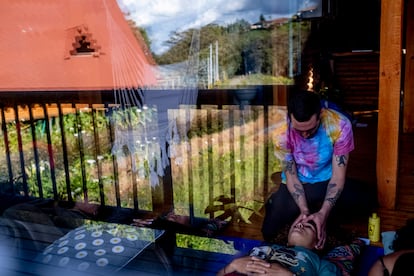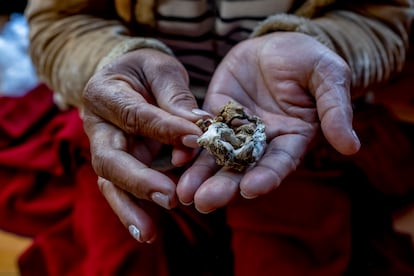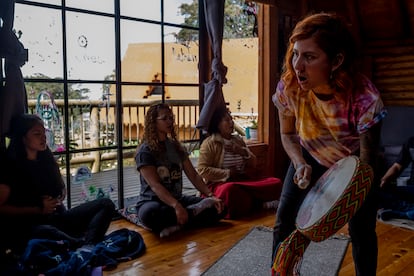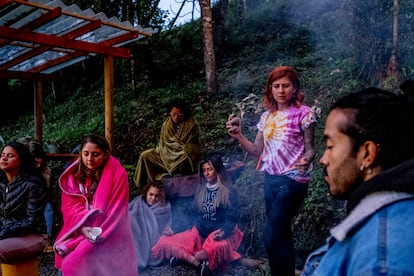Psychedelic therapy: Fighting depression with hallucinogenic mushrooms
‘Magic’ fungi are used for therapy around the world, but in Colombia, their legality remains unclear and their medicinal use unregulated. Last month, EL PAÍS attended a group healing session on the outskirts of Medellín: 12 clients, five guides, and three grams of ‘the flesh of God’ per person

When María del Mar Betancur opens her eyes, she finds a small silicone bag with her name written on it. Inside is a piece of rose quartz and four dried mushrooms. Sitting in a small wood hut, tucked into the hills of the idyllic Colombian town of Santa Elena, the air smells of rosewood and incense. The town is on the outskirts of the country’s bustling capital, Medellín, but here, the noise of the city gives way to the sounds of the jungle. Like María, the other 11 people in the room, sitting together in a circle, open their bags of “magic mushrooms” and handle with curiosity. “Put your intention into them,” counsels 28-year-old Victoria Cubillos Ortega, one of five psychologists accompanying the group on today’s psychedelic therapy session. “Think about what you want the mushrooms to show you,” she says, as each client chews their mushrooms, thoroughly and with intention. For some, this is their first trip — their last resort “after trying everything else.” Others are veteran mushroom eaters. “Ok,” Ortega tells the group, “Now just sit back and enjoy the ride.”
An hour or two later, the three grams of “golden teacher,” as this variety of psilocybin mushrooms is called, begin to take effect. They hit 23-year-old Angie Paulina Reales first. She sits up, crying and squinting her eyes as if bothered by the light. Minutes later, she says she feels scared, like a little chick about to crack her egg and hatch into the world. “I don’t want to be born,” she says. Others spend most of the session overcome with nausea, vomiting constantly. Antonietta Zerpa, 27, spends most of the six-hour ceremony writing in her notebook. Manuela Moreno, 25, sit on swing, crying and clutching her chest. Sebastián Álvarez, 32, says he sees “very beautiful” images from his childhood, and feels his five senses “like never before.” The therapy is collective, but everyone is on their own trip.

The magic is in the psilocybin. Nearly 200 different species of mushrooms contain the compound, which gives the fungi their psychoactive and hallucinatory effect. Psilocybin is the subject of more than 20,000 scientific studies, but researchers have yet to solve the substance’s many mysteries. They have, however, shown that magic mushrooms can be effective in treating depression, anxiety and post-traumatic stress. According to research by Johns Hopkins Medicine, ingesting psilocybin can produce “significant and durable improvements in depression.” And other research has indicated that the drug can be helpful in treating eating disorders and suicidal tendencies.
This is why several countries have moved to legalize magic mushrooms medicinal use. Canada is the latest to recognize the mental health benefits of psilocybin, and six months ago began allowing the substance to be used for therapeutic purposes, joining Jamaica, the Netherlands, Switzerland, and several US states, among others. But Colombia, in its relentless war against psychoactive drugs, still considers mushrooms an illicit and prohibited substance. Sociologist Julián Andrés Quintero, the director of Acción Técnica Social, a Colombian nonprofit focused on psychoactive substance policy reform, says it’s disappointing to live in a country that “has only known the war on drugs.” Successive government administrations have “focused exclusively on eradication,” he says. “And not only in terms of the military, but also in terms of public health policy. In Colombia, our approach has always been to pathologize drug use; it’s part of our DNA. And if that’s your only perspective, it’s hard to accept the fact that these substances have proven benefits that are worth exploring.”
In Colombia, hallucinogenic fungi exist in a sort of legal limbo. You are allowed to grow and transport magic mushrooms for personal use, but processed psilocybin is illegal and there are no regulatory protocols for the substance’s use in therapeutic contexts. Psychologists who prescribe mushroom therapy rely on a constitutional principle that, they say, gives doctors the autonomy to formulate a treatment plan as long as the patient is aware of the risks and is presented with alternative treatment options. This principle, however, does not constitute a legal guarantee against potential lawsuits, in the case of a patient’s injury or death. “Physicians are not legally protected,” explains Pablo Zuleta, an expert in drug consumption, public health, and education policy at Colombia’s Center for Security and Drug Studies (Centro de Estudios en Seguridad y Drogas, or CESED). “The fact that these substances are not regulated means there’s no guaranteed quality standard for patients, and psychologists who use them can be putting their careers in jeopardy.”

This is why treatment sessions are spread mostly by word of mouth, and are very rarely advertised publicly, and why no physician (outside of those directly involved in the therapy sessions) is likely to prescribe psychedelics to their patients. Zuleta says there is still a long way to go before prescribing micro-doses of mushrooms becomes as normal
as prescribing antidepressants. “Each of the substances with medicinal potential (LSD, mushrooms, ecstasy) should be regulated differently than other drugs,” Zuleta says. “They are different in terms of addiction, risks, and medical benefits. We’ve already seen this happen with medical marijuana. But in Colombia, we haven’t even started having this bigger conversation.” The World Health Organization (WHO) estimates that nearly 300 million people suffer from depression worldwide. Of those, more than 30% do not respond well to conventional treatments. Given these findings, and the fact that Colombia boasts nearly 10% of the world’s estimated fungal diversity, advocates say that prohibiting the use of such substances is shutting off access to an important tool for improving the mental health of citizens, which has deteriorated significantly since the beginning of the pandemic. Quintero, from Acción Técnica Social, believes Colombia has a “moral and historical imperative” to set an example on drug policy reform. “The whole conversation will shift on August 7 [the day Colombia’s newly elected president and vice president, Gustavo Petro and Francia Márquez, take office]. I’ve been told they already have plans to develop regulations for psychedelic therapy. There’s a huge sense of expectation, because Petro’s election represents a long-anticipated, historic transition. It’s not going to be easy, but I’m confident that Iván Duque will be Colombia’s last prohibitionist president.”
“They have powers”
In the room, there is a small altar with tobacco, incense, precious stones, and a smiling portrait of María Sabina, the renowned Mazatec healer from the Mexican state of Oaxaca — the shaman famous for presided over a mushroom ceremony for The Beatles in 1969. Sabina is reported to have coined the term “children of god” to refer to the magical fungi, long known as “the flesh of god,” and sometimes “the divine molecule.” Those who try them tend to agree: “They are not from this world,” as the therapists in Santa Elena say. “They have powers.” And for many indigenous communities, especially in Mexico and Central America, this divine power was never a secret. Mushrooms have been an important part of ancestral healing practices for thousands of years.

In honor of these traditions, Victoria Cubillos Ortega, the director of Anowuta, employs other rituals as during her sessions, like snorting snuff, smoking tobacco, and playing traditional instruments like the Amazonian flute or chajchas, a type of small Andean rattle. “Our way of giving back to the mushrooms, of thanking them for everything they
have given us, is to transform our own lives. Not just here, not just today, but tomorrow, and the next day, and the next,” Cubillos Ortega says. “We do it in a way that honors the knowledge of our ancestors.”
When the mushrooms start to take effect, Cubillos Ortega’s eyes are locked on her clients, attentive to their every expression and gesture. She puts her hand on the chest of a patient who seems distressed, whispers into the ear and caresses the head of another who is crying, sets a plastic bag next to another who she can sense is getting nauseous. During the almost nine-hour session, care and support are constant. “The trip is whatever it needs to be. Sometimes it takes you to the darker side, to hell,” she says, “but we’re committed to accompanying people through the whole process, because it’s really important that no one feels alone.
“This is not some hippy thing”
Antonietta Zerpa is sitting on one of the logs in the garden outside the cabin. She rubs her sweaty hands together nervously and smiles shyly. This is the second time that Zerpa, a 27-year-old Colombian-Venezuelan who works as a translator, has participated in psychedelic therapy, but her first time doing it as part of a group. “I used to be a different person,” she says. “I used to live with constant depression and anxiety. Especially after the pandemic. I’ve tried everything, all kinds of therapies: psychiatric, psychological, cognitive, mindfulness... I’ve taken antidepressants. And nothing. But the first time I ate mushrooms, everything changed. I haven’t taken antidepressants or had any of my old dizziness since. This is my only treatment now, this and the therapy consultations.” For María del Mar Betancur, mushrooms were her last resort. “I tried to kill myself twice. But after trying mushrooms, I let go of all that heaviness and saw that I actually had a lot of love in me.”

“People usually think this is just some hippy thing,” says Camilo Durán, a psychotherapist and alternative therapy guide. “But all kinds of people use it. In fact, usually the people who choose to take mushrooms do it only once, and only because we recommend it as part of their therapy. Some come with the intention of trying it, but not most.”
Durán, a 28-year-old Colombian, has been working with psilocybin and growing mushrooms for three years now. “I always knew they could help you reach conclusions
that would be very difficult to reach in a normal state of consciousness,” he says. “During the sessions, it’s common for patients to unlock repressed childhood memories, for example. When a patient recalls a memory during therapy, they process it — it’s almost like they chew it up, and then they can begin to understand it better. And this is a good place to start working through it, using therapy to gain more clarity.”
Back in the cabin in Santa Elena, the windows are covered in pictures of mushrooms and words like “love” and “care” drawn in neon-colored markers. There are paintings on a table, instruments hanging from the stairs, notebooks and pens, and another table full of fruit and snacks. “The fungi help us turn off our judgments and the constant self-censorship that we exercise every day as adults. Which is why the first thing we usually feel is a great desire to be creative,” says Cubillos Ortega as she stirs a cup of hot cocoa, adding in the mushrooms that she grows and dries herself. During the group ceremony, which costs $200,000 Colombian Pesos (about $43 US dollars) per participant, the therapists also ingest psilocybin, though in smaller doses than the patients. “That way they don’t feel judged by people who aren’t also on a trip.”

Sitting outside around a campfire, six hours after taking their mushrooms, participants start to come out of their “trance.” Some share knowing glances with each other. Others close their eyes and sway to the music being played by the therapists. “Pss, hey, how’s it going?” María del Mar Betancur whispers to a friend she came with. “I’m good,” her friend replies, wrapped in a colorful blanket on the other side of the fire. “I still feel weird, but also at peace. You?” she asks back. “Better than ever.”
Tu suscripción se está usando en otro dispositivo
¿Quieres añadir otro usuario a tu suscripción?
Si continúas leyendo en este dispositivo, no se podrá leer en el otro.
FlechaTu suscripción se está usando en otro dispositivo y solo puedes acceder a EL PAÍS desde un dispositivo a la vez.
Si quieres compartir tu cuenta, cambia tu suscripción a la modalidad Premium, así podrás añadir otro usuario. Cada uno accederá con su propia cuenta de email, lo que os permitirá personalizar vuestra experiencia en EL PAÍS.
¿Tienes una suscripción de empresa? Accede aquí para contratar más cuentas.
En el caso de no saber quién está usando tu cuenta, te recomendamos cambiar tu contraseña aquí.
Si decides continuar compartiendo tu cuenta, este mensaje se mostrará en tu dispositivo y en el de la otra persona que está usando tu cuenta de forma indefinida, afectando a tu experiencia de lectura. Puedes consultar aquí los términos y condiciones de la suscripción digital.









































